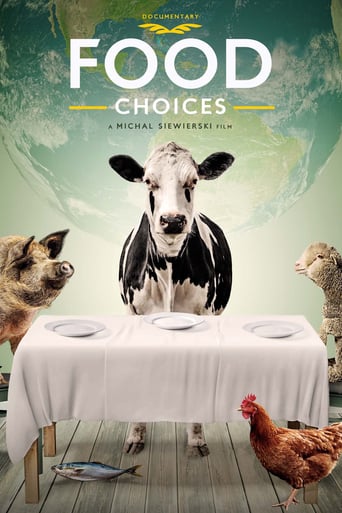

Though I agree that this documentary has some biased information about nutrition, we shouldn't ignore the fact that humans consumption (including food) has a negative impact on our planet. Be open-minded and watch this documentary without prejudice against veganism. I don't think promoting veganism is the main message in this film. You don't need to cut out meat and dairy completely if you're a perfectly healthy human being. But you should consider consuming less of those food. Even if you don't care about our mother earth and animals' life, please think about your children and grandchildren. Don't just live for yourself!
... View MoreVegan movie, for vegan audience. Like in politics, all they say is "I'm right, you're wrong". Fear fear a and more fear, that's their motto, eat meat and you will get cancer, eat egg and you will have erectile dysfunction, etc. A TRUE waste of time. I am not a meat eater, I believe that one must have a BALANCED diet, and that includes all the "demons" this so called movie tries to make you keep out of your life. This is the first review I have ever done, I never got this level of disgust for a film.
... View Moreat last someone pointed out the danger with fish (mercury) but there is other plastics going in to the fish nowadays as well.i am shocked however that everyone says fruit and vegetables are so good for you. some are so fast produced that they don't even have the vitamins in them at all. i live in Sweden and our data comes from 1970 when fruit and vegetables had its course and was healthy and filled with vitamins.another matter is the pesticides used in and around fruit and vegetables. a friend of mine threw away a green apple in the compost. after 6 months it hadn't changed appearance.the government in Sweden is still using the same data sheet from 1970 even though todays produce is nowhere near the same.
... View MoreFood Choices is a medium length documentary on the plant based diet in today's 21st century world. This documentary was refreshing in many different ways. The film was very credible. All the information in this documentary was cited on the screen. The many different interviews throughout the film were with credible sources in many different industries. I appreciated how athletes were included in this documentary. Many men and athletes use the excuse that a vegan diet would not be beneficial to them, so I feel that is film did a great job covering all the bases. This film would benefit many different people including the average Joe, athletes, parents, and young adults. There are many different perspectives given throughout. The director is a parent and talks about a plant based diet for children. If you have seen a lot of other documentaries about plant based diets, you will appreciate how Food Choices covers some of the most common excuses people use as to why they cannot go plant based. This film also has great use of music and sound effects throughout. I appreciated the use of visual graphics with charts and diagrams to visual see what point is being made. Another credible addition to the film was that they added numerous different scientific research papers to support the arguments being made. If you have seen most of the other plant based diet documentaries, I would still highly encourage you to watch Food Choices as it covers different topics not yet argued by other directors.
... View More